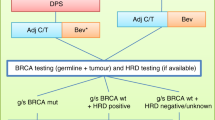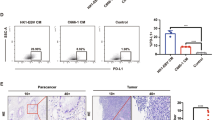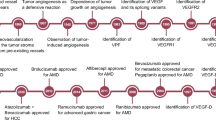Abstract
The prognostic contribution of intratumour VEGF, the most important factor in tumour-induced angiogenesis, to NPI was evaluated by using flexible modelling in a series of 226 N-primary breast cancer patients in which steroid receptors and cell proliferation were also accounted for. VEGF provided an additional prognostic contribution to NPI mainly within ER-poor tumours. © 2001 Cancer Research Campaign http://www.bjcancer.com
Similar content being viewed by others
Article PDF
Change history
16 November 2011
This paper was modified 12 months after initial publication to switch to Creative Commons licence terms, as noted at publication
References
Altman DG and Lyman GH (1998) Methodological challenges in the evaluation of prognostic factors in breast cancer. Breast Cancer Res Treat 52: 289–303
Balslev I, Axelsson CK, Zedeler K, Rasmusen BB, Carstensen B and Mouridsen HT (1994) The Nottingham Prognostic Index applied to 9149 patients from the studies of the Danish breast cancer cooperative group (DBCG). Breast Cancer Res Treat 32: 281–290
Breast Cancer Statistics (2000). J Natl Cancer Inst 92: 445
Collett K (1994). Modelling survival data in medical research. Chapman & Hall: London
Coradini D, Daidone MG, Boracchi P, Biganzoli E, Oriana S, Bresciani G, Pellizzaro C, Tomasic G, Di Fronzo G and Marubini E (2000) Time-dependent relevance of steroid receptors in breast cancer. J Clin Oncol 18: 2702–2709
Durrleman S and Simon R (1989) Flexible regression models with cubic splines. Stat Med 8: 551–561
Ellis LM and Fidler IJ (1996) Angiogenesis and metastasis. Eur J Cancer 32A: 2451–2460
Elston CW and Ellis IO (1991) Pathological prognostic factor in breast cancer. The value of histological grade in breast cancer: experience from a large study with long-term follow-up. Histopathol 19: 403–410
Galea MH, Blamey RW, Elston CE and Ellis IO (1992) The Nottingham Prognostic Index in primary breast cancer. Breast Cancer Res Treat 22: 207–219
Gasparini G (1996) Clinical significance of the determination of angiogenesis in human breast cancer: update of the biological background and overview of the Vicenza Studies. Eur J Cancer 32A: 2485–2493
Goldhirsch A, Glick JH, Gelber RD and Senn H-J (1998) Meeting highlights: International consensus panel on the treatment of primary breast cancer. J Natl Cancer Inst 90: 1601–1608
Grambsch P and Therneau T (1994) Proportional hazards tests and diagnostics based on weighted residuals. Biometrika 81: 515–526
Harrell FE, Lee KL and Mark DB (1996) Tutorial in biostatistics. Multivariable prognostic models: issue in developing models, evaluating assumptions and adequacy, and measuring and reducing errors. Stat Med 15: 361–387
Haybittle JL, Blamey RW, Elson CW, Johnson J, Doyle PJ, Campbell FC, Nicholson RI and Griffiths K (1982) A prognostic index in primary breast cancer. Br J Cancer 45: 361–366
Hayes DF, Trock B and Harris AL (1998) Assessing the clinical impact of prognostic factors: when is “statistically significant” clinically useful?. Breast Cancer Res Treat 52: 305–319
Heimann R, Ferguson D, Powers C, Recant WM, Weichselbaum RR and Halmann S (1996) Angiogenesis as predictor of long-term survival for patients with node-negative breast cancer. J Natl Cancer Inst 88: 1764–1769
Linderholm B, Grankvist K, Wilking N, Johansson M, Tavelin B and Henriksson R (2000) Correlation of vascular endothelial growth factor content with recurrences, survival, and first relapse site in primary node-positive breast carcinoma after adjuvant treatment. J Clin Oncol 18: 1423–1431
O’Connell MA, Belanger BA and Haaland PD (1993) Calibration and assay development using the four parameter logistic model. Chemometrics and Intelligent Laboratory Systems 20: 97–114
Ronchi E, Granata G, Brivio M, Coradini D, Miodini P and Di Fronzo G (1986) A double-labeling assay for simultaneous estimation and characterization of estrogen and progesterone receptors using radioiodinated estradiol and tritiated Org 2058. Tumori 72: 251–257
Saurbrei W, Hubner K, Schmoor C and Schumacher M (1997) Validation of existing and development of new prognostic classification schemes in node-negative breast cancer: German breast cancer study group. Breast Cancer Res Treat 42: 149–163
Silvestrini R, Daidone MG, Luisi A, Boracchi P, Mezzetti M, Di Fronzo G, Andreola S, Salvadori B and Veronesi U (1995) Biologic and clinicopathologic factors as indicators of specific relapse types in node-negative breast cancer. J Clin Oncol 13: 697–704
Silvestrini R, Daidone MG, Benini E, Faranda A, Tomasic G, Boracchi P, Salvadori B and Veronesi U (1996) Validation of p53 accumulation as a predictor of distant metastasis at 10 years of follow-up in 1400 node-negative breast cancers. Clin Cancer Res 2: 2007–2013
Yoshiji H, Gomez DE, Shibuya M and Thorgeirsson UP (1996) Expression of vascular endothelial growth factor its receptor and other angiogenic factors in human breast cancer. Cancer Res 56: 2013–2016
Author information
Authors and Affiliations
Rights and permissions
From twelve months after its original publication, this work is licensed under the Creative Commons Attribution-NonCommercial-Share Alike 3.0 Unported License. To view a copy of this license, visit http://creativecommons.org/licenses/by-nc-sa/3.0/
About this article
Cite this article
Coradini, D., Boracchi, P., Daidone, M. et al. Contribution of vascular endothelial growth factor to the Nottingham prognostic index in node-negative breast cancer. Br J Cancer 85, 795–797 (2001). https://doi.org/10.1054/bjoc.2001.2019
Received:
Revised:
Accepted:
Published:
Issue date:
DOI: https://doi.org/10.1054/bjoc.2001.2019
Keywords
This article is cited by
-
The association between vascular endothelial growth factor expression in invasive breast cancer and survival varies with intrinsic subtypes and use of adjuvant systemic therapy: results from the Nurses’ Health Study
Breast Cancer Research and Treatment (2011)
-
Vascular endothelial growth factor in node-positive breast cancer patients treated with adjuvant tamoxifen
British Journal of Cancer (2003)
-
The prognostic value of vascular endothelial growth factor in 574 node-negative breast cancer patients who did not receive adjuvant systemic therapy
British Journal of Cancer (2002)
-
Infiltrating ductal and lobular breast carcinomas are characterised by different interrelationships among markers related to angiogenesis and hormone dependence
British Journal of Cancer (2002)



